| Spotlight
For a Cleaner Beach
Celebrating International Coastal Clean Up Day

Yamin Tauseef Jahangir
While a lot has been talked about on BBC, CNN and on Aljazeera regarding the vulnerability of the coastal belt, it is not hard to imagine that we too are affected by it to a certain extent. The chaos regarding British Petroleum's (BP) oil spill or the lack of cooperation of the locals and tourists has made things worse over the years.
Cox's Bazar is recognised as the longest coastline beach in the world spanning up to 125 Kilometres, while we only get to explore approximately 5 Kilometres of it. Even then, it becomes extremely difficult to maintain the coastline and preserve its beauty. The International Coastal Cleanup is the largest volunteering effort in the world and on September 23, 2010, it has completed 25 years of its journey so far. The initiative of cleaning up the beach had begun in Bangladesh in 2007 and to date has successfully managed to encourage more volunteers to participate in the act of removing trash and debris from the sea beach.
This year with the help of Kewkradong, Banglalink and Ocean Conservancy students from different schools and universities took part in the major task of cleaning up the longest beach in the world. To name a few there were students from Independent University Bangladesh (IUB), BRAC University, University of Dhaka (DU) and a local school such as Kolatoli High School and others, who volunteered to raise awareness amongst people. They started off with the beach at Kolatoli, then Laboni and later travelled extra miles towards Inani and Himchori to perform the cleanup work. Lead by the moderators of clubs and teachers of these education institutions, students were taught the proper ways of cleaning the beach without hampering the natural habitat around. The students in fact have a lot to say to the society through their volunteering activities. “As a part of the House of Volunteers (HOV) of BRAC University I have had lots of volunteering experience,” says Faisal Rezwan, who now works as a Communication Officer at BRAC. “Working under different situations have made me realise that we all should educate the society in whichever way we can so that people can have proper knowledge and understand the importance of being a volunteer,” he adds. He believes in development and that there should be more awareness campaigns regarding conservation and development of the natural resources in Bangladesh. This will help the locals to get a clear picture of how they all should try to protect their assets. He says, “We had little children helping us in the clean up. If both the educated section and the lower income group work together, we will be able to set an example for the rest of the world and of course the next generation as well.”

A step towards making a difference. The enthusiastic volunteers heading for the Laboni beach
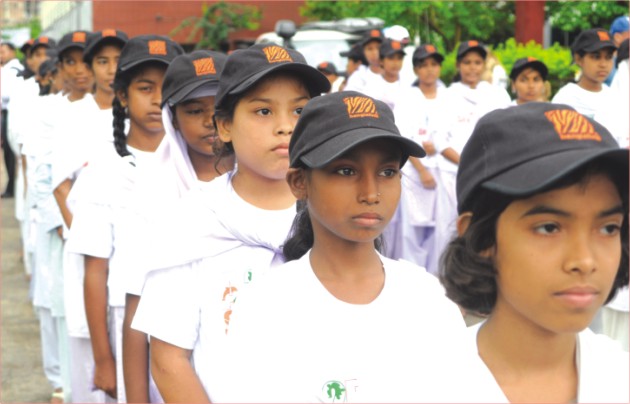
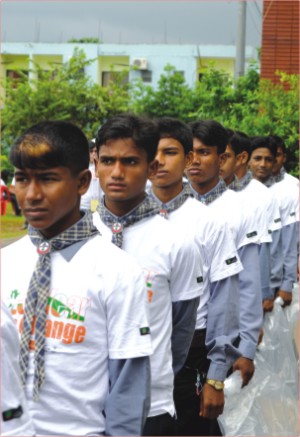 |
| The students were divided into separate groups and each group had a leader who disseminated the work pattern to the team |
Our environment is deteriorating constantly over the past few years with an increase in the sea level, melting of ice and even frequent earthquakes, thereby threatening our life expectancy on the planet. With such conditions prevailing, it is very unwise if we are not conscious of our surroundings and should take initiatives to prevent it from being destroyed. “We always wear a couldn't-care-less attitude when it comes to taking care of responsibilities,” says Tanzil, who has been a student of BRAC University and a member of HOV. “If we talk more about the necessity of projects like coastal cleanup, I am sure that the words will spread around and we will think twice before we opt for littering.” He says that every individual must participate, be it a family or a club in a university.
The coastal cleanup started at around 11 am on Saturday morning and although it was drizzling the students were still enthusiastic and were ready to take up the task. Every individual was handed gloves, bags and caps along with a t-shirt that read 'A 25-year Sea Change'. The students were divided into separate groups and each group had a leader who disseminated the work pattern to the team. Accordingly the groups dispersed in different directions on the entire beach and started to clean up. Three students, Hasib Reza, Jannat Choudhury and Monica Chowdhury from Media and Communications Department of IUB share their views and opinions on the project. “To start an awareness programme firstly, you would need to understand it yourself,” says Hasib, “and if you can make the task interesting then more people will be involved.
Tourism in Bangladesh is very important and if we keep our beach environment clean, it will not be hard to attract tourists from all over the world.” Jannat also shared her thoughts saying that volunteering work is necessary for a character build-up. “It is true that most of us have little knowledge about the environment and how it is being affected. We cannot talk about global warming and expect the locals to understand it, but what we can do is give them education practically or even in the written form such as leaflets which will help them to realise.” She also says that the beach authority should be very strict about construction planning which is in a way harming the beauty of the beach.
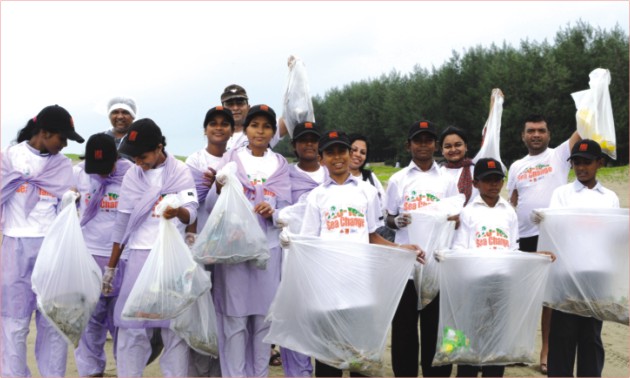
It is the voice of the youth that will set examples and a lot can be done if the society comes forward
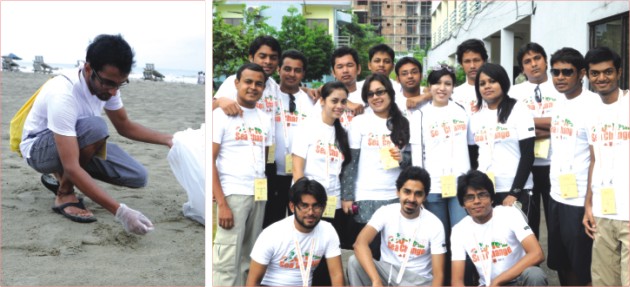
The students in fact have a lot to say to the society through their volunteering activities.
Monica Chowdhury talked about organising programmes and events where the message regarding awareness should also be mentioned. “I do not like it when people smoke on the beach. Previously when the government declared prohibition on smoking publicly, it did create a major awareness. But now things are back to square one.” She suggests that if the beach authority draws a certain boundary on the beach beyond which the smokers will be fined if they do smoke, there will be chances for positive results. “The voice of the youth will make a huge difference and I urge all to set examples to the world. I know we are still being judged with a narrow eye, but we can change their thoughts through such activities. Lastly, all I would say is, do your own dirty work and clean it up yourself!”
The clean up program continued for three hours and later all the teams sat down to count the number of trash that they had collected. It is an effort of the Ocean Conservancy to keep a track on the materials that people usually litter on the beach and that way they would understand how the progress is going as well as keeping a record in their database. Each student counted the cigarette butts, beverage bottles, plastics, food wrappers and other items, which they reported to the team leader. The leader had a form, which was designed specifically for such items, and the numbers were being stored. Yves Marre, the founder of Friendship Floating Hospital, was also present in the programme and when asked about how he felt, he simply was overwhelmed by the efforts of the students. “I sailed all the way from France to Bangladesh back in 1994 and later decided to set up a mobile hospital. I am now settled here for good and I really like Bangladesh.” He says that people are very hospitable and generous, it only takes the right kinds of approach to make them aware of their doings and if the right message is delivered then it is not hard to get positive feedbacks as well. “Seeing the students working with such dedication makes me feel good. They are the youth and they will make the world a better place to live in. Today, we are celebrating International Coastal Cleanup day, and I would want all the young people to be united in this cause and help to improve our future,” he adds.
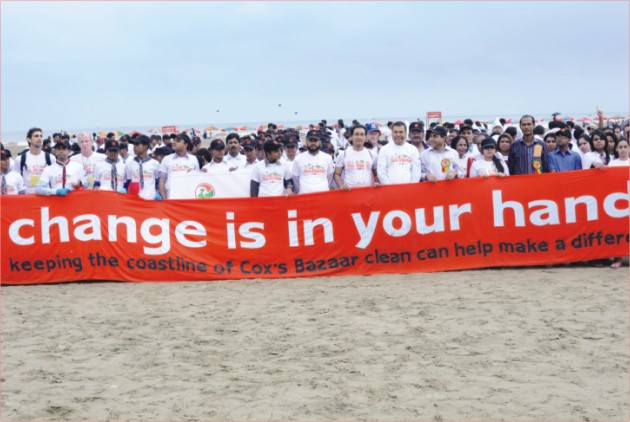
Bangladeshi students are taking up the challenge to prove to the world. If right approaches are taken then we do can get positive results
The locals had very positive views about the students who were working at the beach. Rony who runs a tourism business says, “The tourists are the ones who litter the beach the most. We should put in certain rules, because this is our beach and it is our responsibility to take care of it.”
“I am totally impressed with the way students have taken up this initiative,” says a surfer from Hawaii, “this kind of act needs to be done and it is so good to see that the Bangladeshi students are taking up the challenge to prove to the world. I have travelled a lot of places and did participate in coastal cleanups. I did contribute this time as well and it feels great to be a part of it.”
The International Coastal Cleanup has indeed made a point in our country and how badly we need it. Along with the students, it is also the responsibility of every tourist to cooperate with the authority and keep the beach clean. If we call ourselves to be educated and claim to have good reasoning and understanding then it is also our duty to help those who are involved in such noble work and change the environment.
Photos: Yamin Tauseef Jahangir
|

